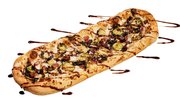Fast Casual Executive Summit
Crust Pizza Co., L&L Hawaiian Barbecue, Gong cha, Juice It Up execs talk the future of franchising
Executive insights from the Fast Casual Executive Summit reveal that the franchising model is rapidly evolving due to technology, changing consumer and franchisee demands, and a focus on data-driven site selection, multi-unit growth and community-level engagement for sustained success and investor returns.

November 7, 2025 by Mandy Wolf Detwiler — Editor, Networld Media Group
The tried-and-true franchise model is undergoing a rapid evolution, propelled by the relentless pace of technological advancement, shifting consumer demands and a fresh set of expectations from franchisees themselves. This dynamic environment is creating both complex challenges and unparalleled investment opportunities for those in the fast-casual sector.
A session at the Fast Casual Executive Summit titled "The Franchise Paradox: Investment, Growth and Empowerment in the Modern Era" at the Fast Casual Executive Summit last month in Austin, Texas, pulled back the curtain on the financial and strategic trends that are fundamentally reshaping the landscape, offering a deep dive into how technology-enabled franchising, the pursuit of scale through multi-unit development and the cultivation of data-driven franchisee communities are becoming the non-negotiable pillars of long-term success and attractive investor returns.
Speakers in the session included Carl Comeaux, CEO of Crust Pizza Co., Andy Huang, vice president and COO of L&L Hawaiian Barbecue, Rebecca Kahn, senior director of master franchising operations for North America — Canada, USA and Mexico for Gong cha Global and Carlo Verdugo, VP of franchise operations and development for Juice It Up. Sohel Roopani, CEO of session sponsor Exponent, served as moderator.
Growth
Roopani asked the panelists what they're doing to help franchisees grow and stay innovative and how franchisors are investing in franchisees.
Verdugo said at the franchise level, Juice It Up is ensuring that location is one of the major keys to success for franchisees. Once on board, Juice It Up executives help new franchisees find the right location for their juice shop.
"Aside from the brand and the products that the brand serves, location is that next most-important thing," Verdugo said. "You can have the best brand and the best people and the best product, but if you're kind of tucked away around the corner, people aren't going to find you."
With AI, technology and analytics, there's so much information available to franchisors and franchisees to help them identify good locations based on sales, demographics and traffic. "We can narrow down what would the most successful intersection or place within a shopping center look like," Verdugo added. Though that data might look good on paper, he recommends visiting a location in person before building and talking to potential customers.
Comeaux said Crust Pizza Co. uses a master broker who knows his brand inside and out.
"He knows exactly what kind of location we're looking for, what kind of site," Comeaux said. "We want to be known as the local pizzeria that gives back to the community we're in. … Yes, all this data is great, but you have to know exactly who your customer is and where they are, and so for us local grocery centers – that's gold for us."
Huang said the majority of L&L Hawaiian Barbecue franchisees are single-unit owners, but lately multi-unit franchisees with two to seven stores have surpassed single units. The brand is helping single-unit franchisees to become multi-unit owners as a growth tactic. Many franchisees are getting older, and the younger generation is taking over for their parents, Huang said. The brand has moved into California with 100 locations and is growing outside of its home state of Hawaii.
"A lot of Californians have been moving to Texas and the East Coast like Georgia and the Carolinas," Huang said. "Then we find our followers there and we opened our stores on the East Coast."
Kahn said Gong cha is similar to L&L Hawaiian Barbecue in that it also has a lot of single and two-store operators. It has 240 stores in the U.S. and 2,200 global units.
"We are a hybrid model of direct franchisees and master franchisees," Kahn said. The majority of North American units are master franchisees. "It's an interesting collaboration with the master franchisees because they're the frontline for the communication with the sub-franchisee and when you have a number of multi- and single-unit operators … it's like herding cats. The sign of a healthy franchise system is one that is growing from within."
The goal for Gong cha is to bring on new franchisees but also ensure that existing franchisees are growing as well.
Responsibilities
Roopani asked the panelists if there have been any role reversals in the responsibilities of franchisors and franchisees.
Verdugo said two-thirds of expansion at Juice It Up comes from existing franchisees. He talked about unit economics and labor and said a 30-year-old brand with legacy franchisees who have been a part of the brand for decades, those franchisees have a different way of thinking, especially single-unit operators. No franchisee in his brand has more than five stores.
For those new franchisees coming in, they're looking for something different – someone with more entrepreneurial savvy and the bandwidth to build out more than one store within a community.
Based in California, Juice It Up must pay the $20-an-hour wage, and when looking to cut costs, labor is the first place most franchisees look. "When we had to raise wages, for our franchisees it was about a $3 to $4 increase from December to January (when the law took effect). Natural instinct is to raise the prices and cut labor," Verdugo said. "Now I've got to look at my employees a little differently (and) hold them accountable. Let's start off in the front and make sure we get the right employees."
Franchisors are not responsible for franchisees' P&L, but they are responsible for the systems that include data and analytics and information that is available according to area traffic. The franchisor looks at speed of service and keeping the quality the same if not better than it has been in the past.
Huang said he thought his brand was the only that who had a problem with franchisees cutting labor costs when times get tough but realized it's a universal problem.
He said good food and good service used to be enough for success, but with so much competition it takes much more to find success in today's restaurant world.
"Now you need to think about how you get into the community, so we've been trying to educate our franchisees. We have a convention every year where we bring in the franchise owners," Huang said. "We share ideas and we share the data with them and really educate them and let them know that we have franchisees with multiple units and we have franchisees with one unit. How can they be successful running multiple units?"
Marketing and name recognition
Roopani asked what the responsibilities were for marketing at the franchise level.
"We want the franchisee to go out there and market to their local community and get involved in their local community," Huang said.
Comeaux said at Crust Pizza Co., they tell local franchisees that they have to become the local mayor in their town for pizza. As an emerging brand, a lot of Crust's franchisees were customers first and loved the brand.
"Most of them, making six figures in corporate America, they wanted to change from working for the man to working for themselves," he said. "So, most of the time when the franchisee comes onboard with us, they sign for one (unit) and once they show they're successful, we'll do multiple stores with them … most of our franchisees within our circle are up to their second or third location." That's a good sign for an emerging brand. … They're known as their local mayor for Crust Pizza within their communities. At the end of the day, everybody knows who they are, and they're going to get catering opportunities (and) they're going to get all of these opportunities they wouldn't get if they weren't out there in their communities."
For Gong cha, Kahn said Gen Z and the young millennial is the target demographic, and they're driven by experiences that are "culturally relevant." She said they want a sense of community and connection while expressing their individuality.
"When it comes to guest behaviors, we see a lot of kids coming into the stores together and kind of gathering around the kiosks together and ordering drinks and taking turns building and customizing," Kahn said. "It's really wonderful to observe. That's probably one of my favorite things to do when I go into a store is to watch our guests actually interact with the technology in our stores."
The guest experience is the shifting responsibility of the franchisor. For years, Gong cha put the guest experience on the franchisee to drive the guest experience with table touches or responding to comments when they come in.
"I think today with how technology is shifting the business, the franchisor holds a lot more responsibility in creating an experience in the digital space that complements the experience the team members are providing in the store," Kahn added.
The Fast Casual Executive Summit is operated by Networld Media Group which owns Fastcasual.com, Pizza Marketplace.com, QSRweb.com and FoodTruckOperator.com. The next in-person restaurant event is the Restaurant Franchising & Innovation Summit March 16-18, 2026, in San Diego, California. Click here for more information.
About Mandy Wolf Detwiler
Mandy Wolf Detwiler is the managing editor at Networld Media Group and the site editor for PizzaMarketplace.com and QSRweb.com. She has more than 20 years’ experience covering food, people and places.
An award-winning print journalist, Mandy brings more than 20 years’ experience to Networld Media Group. She has spent nearly two decades covering the pizza industry, from independent pizzerias to multi-unit chains and every size business in between. Mandy has been featured on the Food Network and has won numerous awards for her coverage of the restaurant industry. She has an insatiable appetite for learning, and can tell you where to find the best slices in the country after spending 15 years traveling and eating pizza for a living.
 ChatGPT
ChatGPT Grok
Grok Perplexity
Perplexity Claude
Claude












